The AMD 2nd Gen Ryzen Deep Dive: The 2700X, 2700, 2600X, and 2600 Tested
by Ian Cutress on April 19, 2018 9:00 AM ESTCPU Encoding Tests
One of the interesting elements on modern processors is encoding performance. This includes encryption/decryption, as well as video transcoding from one video format to another. In the encrypt/decrypt scenario, this remains pertinent to on-the-fly encryption of sensitive data - a process by which more modern devices are leaning to for software security. Video transcoding as a tool to adjust the quality, file size and resolution of a video file has boomed in recent years, such as providing the optimum video for devices before consumption, or for game streamers who are wanting to upload the output from their video camera in real-time. As we move into live 3D video, this task will only get more strenuous, and it turns out that the performance of certain algorithms is a function of the input/output of the content.
All of our benchmark results can also be found in our benchmark engine, Bench.
7-Zip 9.2: link
One of the freeware compression tools that offers good scaling performance between processors is 7-Zip. It runs under an open-source licence, is fast, and easy to use tool for power users. We run the benchmark mode via the command line for four loops and take the output score.
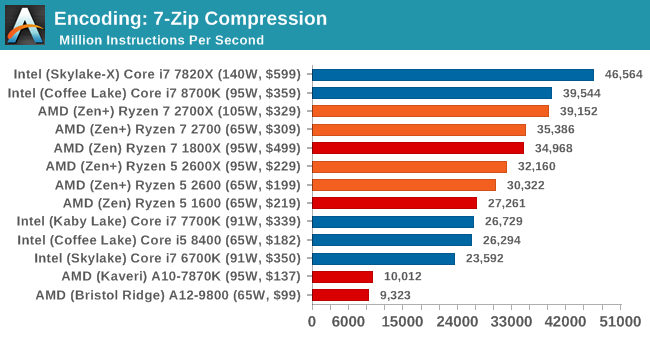
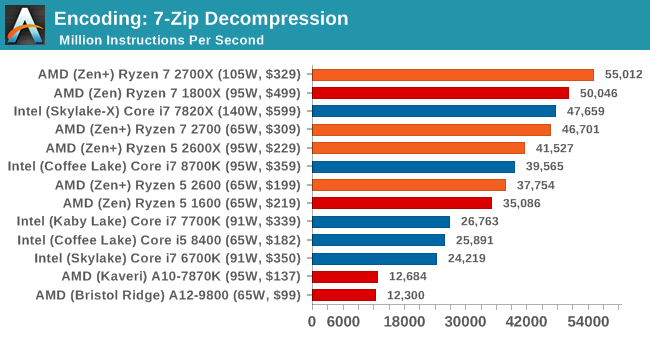
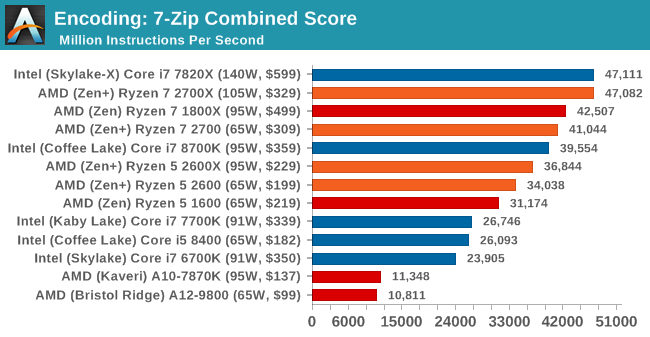
WinRAR 5.40: link
For the 2017 test suite, we move to the latest version of WinRAR in our compression test. WinRAR in some quarters is more user friendly that 7-Zip, hence its inclusion. Rather than use a benchmark mode as we did with 7-Zip, here we take a set of files representative of a generic stack (33 video files in 1.37 GB, 2834 smaller website files in 370 folders in 150 MB) of compressible and incompressible formats. The results shown are the time taken to encode the file. Due to DRAM caching, we run the test 10 times and take the average of the last five runs when the benchmark is in a steady state.
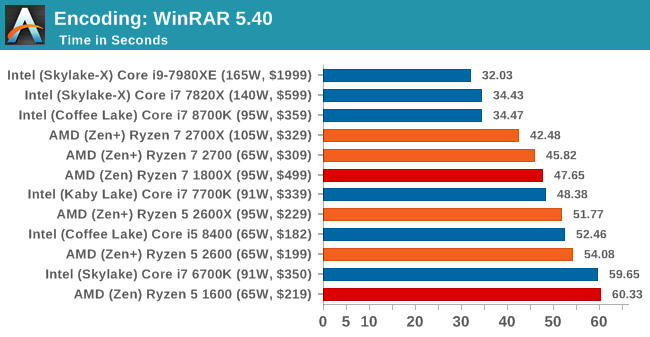
WinRAR requires a good memory base, so we see the quad-channel processors heading up the pack. The high IPC of the Core i7-8700K also does well.
AES Encoding
Algorithms using AES coding have spread far and wide as a ubiquitous tool for encryption. Again, this is another CPU limited test, and modern CPUs have special AES pathways to accelerate their performance. We often see scaling in both frequency and cores with this benchmark. We use the latest version of TrueCrypt and run its benchmark mode over 1GB of in-DRAM data. Results shown are the GB/s average of encryption and decryption.
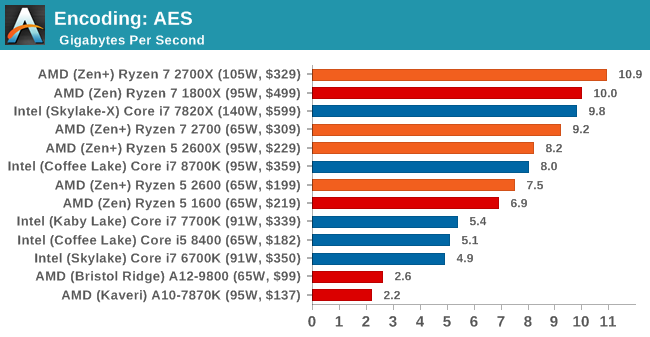
HandBrake v1.0.2 H264 and HEVC: link
As mentioned above, video transcoding (both encode and decode) is a hot topic in performance metrics as more and more content is being created. First consideration is the standard in which the video is encoded, which can be lossless or lossy, trade performance for file-size, trade quality for file-size, or all of the above can increase encoding rates to help accelerate decoding rates. Alongside Google's favorite codec, VP9, there are two others that are taking hold: H264, the older codec, is practically everywhere and is designed to be optimized for 1080p video, and HEVC (or H265) that is aimed to provide the same quality as H264 but at a lower file-size (or better quality for the same size). HEVC is important as 4K is streamed over the air, meaning less bits need to be transferred for the same quality content.
Handbrake is a favored tool for transcoding, and so our test regime takes care of three areas.
Low Quality/Resolution H264: Here we transcode a 640x266 H264 rip of a 2 hour film, and change the encoding from Main profile to High profile, using the very-fast preset.
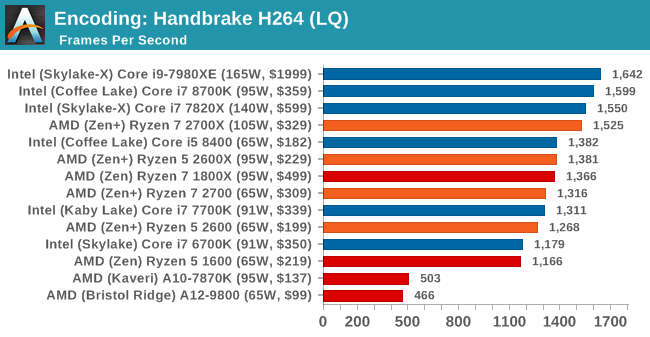
High Quality/Resolution H264: A similar test, but this time we take a ten-minute double 4K (3840x4320) file running at 60 Hz and transcode from Main to High, using the very-fast preset.
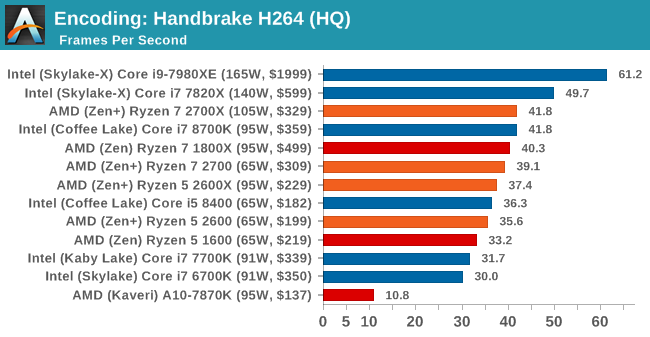
HEVC Test: Using the same video in HQ, we change the resolution and codec of the original video from 4K60 in H264 into 4K60 HEVC.
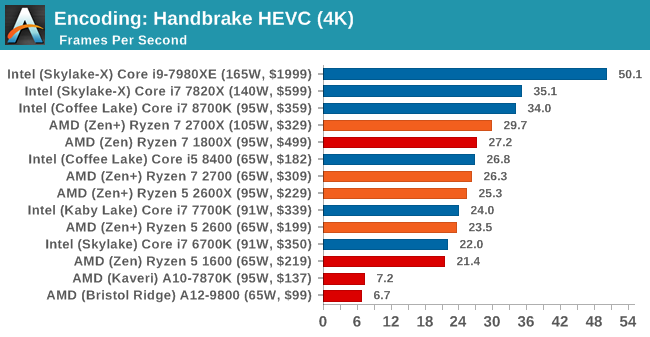
For HandBrake video encoding of large frames, there is a bump with the new Ryzen-2000 series processors over the previous generation, however there is still a gap up to the Core i7-8700K. The Core i5-8400 puts in a good showing here, above all but the best Ryzen parts.










545 Comments
View All Comments
DisoRDeR4 - Thursday, April 19, 2018 - link
Thanks for the review, but I noticed a minor error -- your AMD Ryzen Cache Clocks graph on the 3rd page shows data for the 2700X, but in the preceding text it is referred to as the 2800X.IGTrading - Thursday, April 19, 2018 - link
AMD wins all gaming benchmarks, hands down and does this at a real 105W TDP.In my opinion, it is not fair to say that Intel "wins" the single threaded scenarios as long as we see clearly that the 8700 and the 8700K have the "multi-core enhancement" activated and the motherboard allows them to draw 120W on a regular basis, like your own graphs show.
Allow AMD's Ryzen to draw 120W max and auto-overclock and only the would we have a fair comparison.
In the end, I guess that all those that bought the 7700K and the 8700K "for gaming" are now very pissed off.
The former have a 100% dead/un-upgradeable platform while the latter spent a ton of money on a platform that was more expensive, consumes more power and will surely be rendered un-upgradeable soon by Intel :) while AMD already rendered it obsolete (from the "best of the best" POV) or at least the X370+8700K is now the clear second-best in 99% of the tests @ the same power consumption while losing all price/performance comparisons.
IMHO ... allowing the 8700 & 8700K to draw 120W instead of 65W / 95W and allowing auto-overclocking while the AMD Ryzen is not tested with equivalent settings is maybe the only thing that needs to be improved with regards to the fairness of this review.
Thank you for your work Ian!
Luckz - Monday, April 23, 2018 - link
The 2700X draws so much more than its fake on-paper TDP it's not funny. With XFR2 and PB2 of course.PBO can add even more.
Ninjawithagun - Thursday, April 19, 2018 - link
Incorrect comparison. Why does every review keep making the same mistake?? It has nothing to do with price. Comparing like CPU architectures is the only logical course of action. 6 core/12 thread vs 8 core/16 thread makes no sense. Comparing the Intel 8700K 6 core/12 thread @ $347 to the AMD 2600X 6 core/12 thread @ $229.99 makes the most sense here. Once the proper math is done, AMD destroys Intel in performance vs. cost, especially when you game at any resolution higher than 1080P. The GPU becomes the bottleneck at that point, negating any IPC benefits of the Intel CPUs. I know this how? Simple. I also own a 8700K gaming PC ;-)SmCaudata - Thursday, April 19, 2018 - link
I'd like to see more scatterplots with performance versus cost. Also, total cost (MB+CPU+cooler if needed) would be ideal. Even an overall average of 99th percentile 4k scores in gaming (one chart) would be interesting.... hmmm maybe a project for the afternoon.Luckz - Monday, April 23, 2018 - link
The English-language version of the Tomshardware review has a million plots on the last page (14). 4K is complete irrelevant for plotting though since you're GPU-limited there.Krysto - Thursday, April 19, 2018 - link
Wrong. Performance at a given price level is absolutely a metric chip buyers care about - if not the MOST important metric.People usually think "Okay, I have this $300 budget for a CPU, which is the best CPU I can get for that money?" - It's irrelevant whether one has 4 cores or 8 cores or 16 cores. They will get the best CPU for the money, regardless of cores and threads.
Compared core vs core or thread vs thread is just a synthetic and academic comparison. People don't actually buy based on that kind of thinking. If X chip has 15% better gaming performance than the Y chip for the same amount of money, they'll get the X chip, regardless of cores, threads, caches, and whatnot.
Ninjawithagun - Thursday, April 19, 2018 - link
Incorrect. Cost vs. Cost is only one of many factors to consider, but is not a main one, especially if the competition has a processor of equal quality for much less cost. Comparing an Intel 6 core/12 thread CPU to an AMD 8 cores/16 thread CPU makes absolutely no sense if you are measuring cost vs. performance. Your argument makes no sense, sorry.fallaha56 - Thursday, April 19, 2018 - link
Ok by your rationale we should compare Threadripper to 8700k tooNinjawithagun - Thursday, April 19, 2018 - link
Now you are just being stupid.